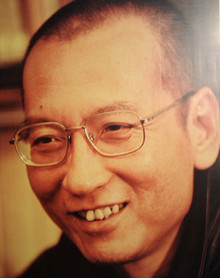
He was praised by the Nobel committee today for his "long and non-violent struggle for fundamental human rights in China".
Liu was arrested in 2008 after co-authoring Charter 08, which called for political reform and human rights in China. He was sentenced to 11 years in prison on Christmas Day 2009, charged with inciting subversion of state power.
Making the announcement today in Oslo, Nobel Committee president Thorbjoern Jagland said the committee "has long believed that there is a close connection between human rights and peace", and called Liu "the foremost symbol of the wide-ranging struggle for human rights in China".
Last month, the Nobel committee was warned by the Chinese foreign ministry that awarding Liu the prize would send the wrong message to the world and would affect relations between Oslo and Beijing.
Jagland was critical of China in his announcement however, accusing it of being "in breach of several international agreements to which it is a signatory" and condeming its human rights abuses and restriction of free speech.
Amnesty International today called on the country to release all prisoners of conscience.
"Liu Xiaobo is a worthy winner of the Nobel Peace Prize, we hope it will keep the spotlight on the struggle for fundamental freedoms and concrete protection of human rights that Liu Xiaobo and many other activists in China are dedicated to," said Catherine Baber, deputy Asia-Pacific director at the human rights group.
Liu's wife, Liu Xia, told CNN she will inform her husband of his award tomorrow during a prison visit.
Liu was first arrested after taking part in the 1989 Tiananmen Square protests and was later sentenced to three years in a labour camp in 1996.
Image: Laihiu on Flickr. Some rights reserved.
Free daily newsletter
If you like our news and feature articles, you can sign up to receive our free daily (Mon-Fri) email newsletter (mobile friendly).
Related articles
- Ronson Chan, deputy assignment editor of Stand News, on press freedom in Hong Kong
- 'Cinematic journalism': why China Daily used 360° footage to preserve Hong Kong riots in time
- How news organisations in Asia-Pacific are getting readers to pay attention
- How international collaboration helps investigative journalists overcome challenges
- What happens when bots become editors?









